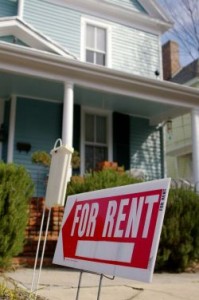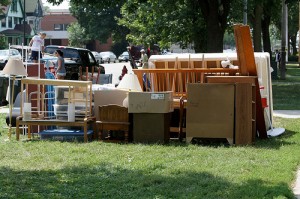Posted by Teresa on November 17, 2009 under Landlord Tips, Rents and Deposits | 
 Rent collecting is the number one headache we hear from landlords. Lots of tenants, it seems, cannot seem to pay on time. Plus, there’s the time wasted making collection phone calls, picking up rent personally, dealing with checks and bank deposits, bad checks, and visits to the post office.
Rent collecting is the number one headache we hear from landlords. Lots of tenants, it seems, cannot seem to pay on time. Plus, there’s the time wasted making collection phone calls, picking up rent personally, dealing with checks and bank deposits, bad checks, and visits to the post office.
More people than ever pay their bills online. Health clubs have automatically debited their monthly fees from members’ accounts for years. Your tenants probably already pay insurance and car payments automatically every month. Why not offer them a way to pay their rent online, too?
Rentmatic is an automated rent payment service that debits your tenants’ bank accounts on the day rent is due, and transfers the funds to your designated account. It’s free to sign up, but they charge a fee of $3.95 for each unit that is on the automatic system (there is a discount for 25 units or more). The company also offers dynamic features like free data storage and an online tenant communication, where tenants can request maintenance and the landlord can email all or selected tenants. And, they offer tenants an incentive to pay online, with a chance to win a $50 prize every month.
ClearNow collects and transfers rent payments through the ACH protocol. The service is $14.95 per month, including one tenant, plus $2 per additional tenant. The service sends reminder emails eight days prior to debiting tenants’ accounts, which is done on the first banking day of the month. Three days after debiting tenant accounts, the funds are credited to the landlord’s account.
Required paperwork for online rent payment services is minimal; you can incorporate the authorization into your new tenant paperwork easily. Be sure to keep copies of all signed agreements and authorizations in your tenant files.
We recommend you also automatically
screen all tenants as part of your application process. For more landlord resources, including forms and information on
tenant screening, turn to
E-Renter.com. .
Posted by Teresa on October 20, 2009 under Landlord Tips, Marketing for Landlords, Rents and Deposits | 
 If you’re a landlord with a vacancy or two, fall can be a difficult time or year to fill them. Coupled with the renter’s market we’re in, you could need to think more creatively to turn those vacancies into occupied rentals. Here are some great ideas to try if you want to attract great tenants:
If you’re a landlord with a vacancy or two, fall can be a difficult time or year to fill them. Coupled with the renter’s market we’re in, you could need to think more creatively to turn those vacancies into occupied rentals. Here are some great ideas to try if you want to attract great tenants:
Lower the rent: lowering your rent might be the last thing you want to do, but sometimes it’s necessary. Do you know what the market rents are for similar properties in your area? If you haven’t checked them out lately, you may find that they’ve dropped—while you’re still asking a previum for your property. HUD publishes the Fair Market Rents for every metropolitan area in the United States, which is accessible on their website: http://www.huduser.org.
Landlords can also check out rentometer.com, which uses a proprietary algorithm to tell you if the rent you are charging for a property is too low, way too high, or reasonable. Just enter the address, number of bedrooms, and rent you are considering, and you’ll get an idea of what other units in the neighborhood are renting for. Smart tenants know. You should, too.
Waive one month’s rent: If your rent is where it should be, or you don’t want to set the precedent of lowering it, offer a free month’s rent to a qualified tenant. Mathematically, it could work out the same for your bank account, but psychologically, “free” is a major enticement to the tenant. It’s up to you to give the free month up front, in the middle, or at the end of the lease.
Upgrade or pray the utilities: If your rental property has basic cable, offer to pay for an upgrade to premium. Or give the tenant high-speed wireless Internet access for six months or a year. You could even pay the water bill, with a monthly dollar limit to discourage waste.
Replace the carpet, blinds, or an old appliance: If you have a great prospective tenant that you’re afraid will walk away, offer new carpeting if your unit needs it, or upgraded mini-blinds, or install a new stove or refrigerator. Most of these upgrades can be amortized over several years’ worth of tenants—but might be just the thing to entice one to move in now!
Posted by Teresa on October 2, 2009 under General, Landlord Tips, Rents and Deposits | 

Allowing pets or not: that is the question. For many landlords, the answer is not quite as simple as it once was. For one thing, it seems that more tenants than ever have or want pets. They expect more rental units to accept pets. And it’s a renter’s market, with a flood of rental properties coming on the market and vacancies at all-time highs in some areas.
If you are a landlord who continues to hold a “no pets” policy, then you are limiting your pool of available tenants—perhaps by half, according to the Humane Society of the United States. If all of your rental properties are leased, then you probably don’t need to revisit your policy—but if you have empty units, a “no pets” policy could be hurting you. If you are considering allowing pets, here are some tips that can help make it a win-win situation for you and your pet-loving tenants.
In a perfect world, all pet owners are responsible and can afford to take care of their four-legged “children.” They happily pay extra pet deposits and will take care of any damages that their dog or cat inflicts on your property. They make it easy to be a landlord in a pet-friendly world! On the other side of the spectrum are the neglectful pet owners, who don’t take proper care of their pets, don’t care where they relive themselves or if they tear up the carpet, yard, or woodwork. Keep these folks in mind when you write your tenant pet policy.
First, determine the type and size of pets you will allow in your rentals. You can decide if you want to limit tenants to keeping just dogs, or dogs and cats, or everything from iguanas, to snakes, to birds. Next, decide if you will block certain breeds of dogs, such as so-called “dangerous” breeds, or limit dogs to a maximum weight.
You can reserve the right to screen your tenants’ pets just as you screen tenants. Meet the animal to see if they are friendly or badly behaved. Does the tenant have control over the pet—or vice versa? Consider how long the tenant has had the pet—if it is brand new to the tenant, the unknown factor could be more than you want to take on.
Consider charging a pet security deposit on top of your standard deposit. Most pet owners are comfortable with paying extra for their pets. Check your state and local security deposit guidelines for legalities.
Outline your tenants’ responsibilities clearly in the pet policy. Indicate where the dog is allowed, that it must be kept on a leash outside if that’s what you desire; spell out that the tenant must properly dispose of waste; and that excessive barking or other noise will not be tolerated.
Make sure your liability insurance covers tenant pets; consider requiring your tenants with pets to carry their own renter’s insurance as well. Check with your insurance agent for specifics.
Check the pet’s references, too! If the tenant has had his or her cat, for example, in previous rentals, the landlord or property manager will usually tell you exactly what they faced when the tenant vacated the property. Some cats can inflict a great deal of damage—especially when they are not altered—so ask for references—and check them!
According to the Humane Society of the United States, millions of animals are abandoned to shelters every year because their owners are moving or because a new rental does not allow animals. Writing a strict tenant pet policy and communicating your expectations to your tenants can allow some of those pets to remain with their families—and keep your rental units filled.
Posted by Teresa on August 25, 2009 under Landlord Tips, Rents and Deposits, Tenant Credit Checks | 
 As the housing marketing continues to struggle, many landlords are finding themselves in a tough spot. Perhaps you’re one of them: vacancies are rising, your bank is tightening up your credit line and won’t refinance your mortgage, and you really need a positive cash flow.
As the housing marketing continues to struggle, many landlords are finding themselves in a tough spot. Perhaps you’re one of them: vacancies are rising, your bank is tightening up your credit line and won’t refinance your mortgage, and you really need a positive cash flow.
If your tenants are smart, they know that in some areas, it’s a renter’s market—and they could be planning to ask you for a rent reduction, especially if they feel they’re paying more than the market dictates.
What should a landlord do if a tenant asks for lower rent?
- Determine whether or not your tenant has a valid case for a reduction in rent. Look at your local rent market, and compare your rents to similar units. You should always be aware of the fair market value in your area—and there are plenty of resources to guide you.
- Analyze your cash flow. If you determine your rent is above market value, but you can’t lower the rent and stay profitable, look for ways to reduce expenses. Perhaps you can take over landscaping duties from your contracted service. Or, perform small repair and maintenance yourself for awhile. You could even offer a compromise, such as keeping the rent the same, but covering some utility costs.
- Analyze the tenant’s history. Does the tenant pay on time every month? Have there been any complaints against them? How careful are they with your property? If they have been a great tenant, compare the rent reduction request with the hassle of finding a new tenant. You may find that peace of mind will make the reduction more palatable.
- Advise that you will be conducting a tenant credit check—and then follow through. If your tenant’s credit status has changed since the lease was signed, a thorough screening is the only way to find out. You may discover credit problems that indicate the tenant is not a good candidate for lower rent negotiations.
As a landlord, you are in a constant balance act to obtain and keep good tenants who pay on time. As the economy starts to slowly recover, you may have to concede to belt-tightening or reducing rents in order to attract and keep your best tenants.
Posted by Teresa on May 20, 2009 under Landlord Tips, Rents and Deposits | 
 If you’re a landlord, we hope you’ve already established solid policies and procedures for collecting rent and shared them with your tenants—in writing. If not, go do that immediately and come back when you’re through!
If you’re a landlord, we hope you’ve already established solid policies and procedures for collecting rent and shared them with your tenants—in writing. If not, go do that immediately and come back when you’re through!
For the rest of you, here are a few pointers for collecting rent that may help keep your blood pressure—and your bottom line—at a healthy level.
1. Do not allow multiple checks: Roommates might prefer to pay you separately for their share of the rent. The trouble begins when someone’s division is wrong or not all roommates pay promptly. It is not your responsibility to track down multiple tenants for rent on the same unit. Require them to figure out who owes whom and to present one check for the rent.
2. Remind tenants when rent is due: You could provide monthly invoices or reminders, or even a rent payment coupon book to help your tenants keep track of when their rent is due. For routinely slow payers, a phone call five days before rent is due is reasonable.
3. Contact tenants immediately if rent is late: Stay calm and businesslike, but do not hesitate to call tenants about late payments. Determine the cause of the problem, and inform them of their options.
4. Avoid accepting partial payments: If an excellent tenant requests a chance to pay in part, you can consider allowing this, but make them aware it is a one-time deal. And then, present the tenant with paperwork to sign: either an agreement to pay the rest by a specific date or a legal rent demand notice. And remember that in most states, accepting partial payments voids any prior legal notices for nonpayment of rent.
5. Offer small incentives for prompt payments: It may seem like a stretch in a down economy, but times like this are perfect for rewarding your tenants who pay on time. Purchase pizza or movie rental gift certificates and mail or hand them to your prompt paying tenants. Even small gestures encourage more good behavior.
6. Don’t consider a cash discount: Rather than charging a late fee, some landlords set the rent higher, and then offer a discount to entice tenants to pay rent on time. The courts have historically frowned upon this. If you want tenants who pay on time, then prescreening tenants is a better practice.
7. Don’t redeposit bad checks: If a tenant bounces a check, it is best to require a cashier’s check or money order to replace it. (And for all subsequent rent checks from that tenant.) But if they swear the bad check is now good, rather than re-depositing it, go to the tenant’s bank and either cash it or have them certify it so you can deposit it into your account without worry.
8. Don’t waive late charges: There is no good way to bend the rules. You have established policies to protect yourself from lawsuits—so follow them. Treating a tenant more favorably than others can lead to accusations of discrimination. Waiving late charges will mean you cannot reasonably begin charging them again.
9. Keep late charges and returned check charges reasonable: Many states have limits on how much a landlord can charge for late fees. Check out your local laws, too. Returned check fees should be based on what your bank charges you, plus enough to reimburse your time to deal with it. And remember, if your tenant makes good on a bounced check after your standard grace period, they are responsible for late fees as well.
10. Keep good records: If your tenants pay by mail, record the date you receive their checks. If they pay in person, give them a receipt. If you receive a rent payment by mail after the due date, keep the envelope’s postmark in case your tenant disputes a late charge.
Posted by Teresa on April 22, 2009 under Landlord Paperwork and Forms, Landlord Tips, Rents and Deposits | 

Photo Courtesy of flickr
Tenants move out. That’s a reality that every landlord and property manager faces. And when working with all types of tenants, it follows that you’ll have all kinds of move-out experiences—some good, some very bad. Here are a few things to look out for, and some procedures you might find helpful.
Preparing for Move-Out Day
You should really have started preparing for move-out day when your tenant moved in. If you were proactively communicating with your tenant from the start, you already completed a Check-In Sheet. Establishing the condition of the unit upon signing the lease, then using the same list to evaluate on move-out day, is a simple way to track any damage and appropriate charges.
Be Consistent
Maintaining clear communication and working from established procedures are two themes we visit often in this blog. If you have standard procedures and forms in place, every interaction with your tenants will be easier on both parties—and will keep you covered from a legal standpoint as well. Remember that you do not want to be seen as discriminating against any tenants, so you must require the same paperwork and notices from all.
Security Deposit Disputes
This is the number one problem in landlord tenant relationships. Many tenants have a fear of not receiving their security deposit back. If you’ve been inspecting the property on a regular basis, then your tenant has had ample opportunity to point out any problems that could affect their deposit. Still, your definition of “ordinary wear and tear” could vary greatly from your tenants’. Be fair, but firm, take reasonable deductions and provide a thorough accounting of the security deposit. Return the balance promptly, and comply with all local laws covering interest and time limits.
Written Notice
If your tenant mentions in passing or calls specifically to inform you they’re moving, let them know you require written notice. Remind them that the rental agreement states this clearly, and that you need to be sure all are in compliance with the lease and with the law. Provide them with a simple Tenant’s Notice to Vacate Rental Unit form, covering the property address, names, dates, reason for moving, and allowing you access to the unit to inspect and show the unit to prospective tenants or repair people. Do not allow the tenant to skip giving you notice in writing—it brings too many possibilities for problems!
Next post: In Tenants Moving Out, Part II, we’ll explore some additional suggested procedures, the Move-Out Inspection, and help define “ordinary wear and tear.”
Posted by Teresa on January 24, 2009 under Rents and Deposits | 
The law in each state regulates rental security deposits, giving specific requirements for how money is held during the lease and how the return of that deposit is handled at the end of the lease.
Landlords may be required to hold the security deposit in a separate bank account, and if there is interest earned the laws may indicate who is to receive that interest. Additionally, the state laws will specify the timing of the return of the deposit to the tenant, and usually require a written explanation of any amount retained by the landlord.
Posted by Teresa on January 20, 2009 under Rents and Deposits | 
It’s important to clarify the difference between a security deposit and advance payment of rent. A security deposit is given from a tenant to the landlord to be held in the event there is damage to the property, caused by the tenant.
Advance payment of rent equal to a full or partial month is sometimes collected, to assure the landlord will receive the final month’s rent when the tenant vacates. A security deposit cannot be used by the tenant for that last month’s rent.
The tenant needs to pay the rent on time (or risk being in default of the terms of the lease). The security deposit is then returned to the tenant (the terms of that are addressed by the lease and by state laws).
Reduce the possibility of late or non-payment of rents and disputed deposits with effective
tenant screening from
E-Renter USA.
Posted by Teresa on December 15, 2008 under Rents and Deposits | 
It’s not only acceptable to charge a rental application fee to those who want to rent your property, there are several reasons why it’s a good idea:
- Probably the most obvious reason is that is pays for your time and expense to screen applicants.
- It will also reduce the number of unqualified applicants you get. Most will not bother to apply if they know you are going to check credit and they are unlikely to qualify.
- In addition, it will let all tenants know that you are serious about the business of managing your rental (even if you have only one).
Guidelines for Rental Application Fees
Even though you are entitled and should charge the fee, there are some guidelines for doing so.
- It should be a reasonable fee to cover costs (in many states it is against the law to be profiting from these fees).
- You must inform the applicants what kind of check you will do and inform them of their rights regarding the information you gather.
- If you use a tenant screening service, you must inform them of the name of that company.
You should also become familiar with the Fair Credit Reporting Act and other laws affecting credit reporting (a good tenant screening service can provide assistance with that information). The application fees themselves may only be charged if you actually have (or will have in a short period of time) a unit available to rent, and if you actually do screen the tenant.
Posted by Teresa on October 1, 2008 under Rents and Deposits | 
Even the best of tenants occasionally find themselves in a situation where they cannot pay the rent on time. How you as the landlord handle late or non-payment can make a large difference in your relationship with all your tenants!
Treat Tenants Fairly, but Firmly
The goal is to treat tenants fairly and with some understanding, while at the same time protecting yourself, your income, and your ability to evict tenants when necessary.
- You should be understanding of occasional late payments
- Make it clear to all tenants that continually falling in arrears won’t be tolerated
- Written information to tenants should clearly state what your arrears policy is: Do you have a grace period? Is there a fee for late payment beyond a certain number of days? How many months can they be late before you start the eviction process?
- When a tenant does fall behind, the first course of action is always to speak directly with them to determine the problem. Be sure to document all conversations, just in case you do need to follow through with eviction
Reduce the possibility of late or non-payment of rents and disputed deposits with effective
tenant screening from
E-Renter USA.
 Rent collecting is the number one headache we hear from landlords. Lots of tenants, it seems, cannot seem to pay on time. Plus, there’s the time wasted making collection phone calls, picking up rent personally, dealing with checks and bank deposits, bad checks, and visits to the post office.
Rent collecting is the number one headache we hear from landlords. Lots of tenants, it seems, cannot seem to pay on time. Plus, there’s the time wasted making collection phone calls, picking up rent personally, dealing with checks and bank deposits, bad checks, and visits to the post office.




